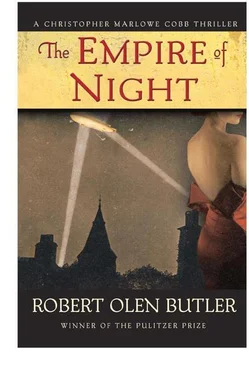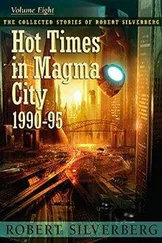I had to be very careful now. I’d said the right things so far. I sensed the possibility that I’d won his trust. At least for this evening’s conversation. There were things on his mind. He wanted to talk, even still sober, though I had to figure he’d already been drinking this evening. But something about him seemed almost needy. Careful , I said to myself. His commitment to Germany and its interests would be fine to hear. But I needed to know his plans . I was tempted to try to guide him there directly. Incrementally but directly. But even in this state of mind, even if he’d had a few drinks, he wasn’t a dirty alderman ready to brag about his doings. This man was dangerous.
So was I. But I had to be careful.
“I like America,” I said. “I grew up there. You cannot help but feel a certain allegiance to the place where you are reared, particularly if it rewards you in many ways. Rewards and even nurtures you.”
“Like a benign stepfather,” Stockman said.
“Like a benign stepfather,” I said. “But there are stronger bonds than those.”
“It is not his blood in your veins,” he said.
I nodded. He’d leaped in to finish my thought, seemed to want to answer this question himself.
But he said no more. He leaned forward and took up his stein and sat back again. He drank.
I did likewise.
“Eventually you have to choose,” I said, to finish the thought.
He took the stein away from his lips. “Do you like this special German beer?” he asked.
“I do,” I said.
“Some would say it is too strong in its taste, too thick on the tongue.”
Stockman seemed in an odd mood. I wasn’t sure if it was just beer he was talking about.
I said, “I don’t acknowledge the idea of ‘too strong.’ It does things the beers of other countries cannot. This is good. No other beer in the world tastes both of the earthiness of malt but also of a sweet something that reminds one of nothing other than a fine port wine.”
This made Stockman straighten a little, consult his palate. He smiled. “So it does,” he said.
We drank some more.
“Blood is stronger than nurturing,” Stockman said, following an associative track in his head that surfaced and submerged and surfaced again.
“Blood is stronger,” I said.
“Blood,” he said, “does not make itself new with each generation. It is perpetual. It is eternal.”
I nodded. He fell silent, working out his thoughts inwardly. I was tempted to again affirm my agreement with him, but I kept my own silence. I didn’t want to interrupt his process.
“Civilization is borne onward by a current of blood,” he said.
He was speaking German now.
He stopped again. But he did not seem inward. He was watching my eyes, as if waiting for me to comment. Was he testing me?
“The truth you just spoke,” I said, also in German. “Is it a quotation from von Herder?”
He smiled.
“Someone else?” I asked.
“My own thoughts,” he said.
“Excellent,” I said. “I’m sorry I’m not taking any of this down.”
“Nor should you,” he said. “When I am commenting for the public record, I will tell you.”
We were speaking only German now.
“I am eager,” I said.
The officers beyond him laughed.
Stockman glanced over his shoulder.
“They go with joy,” he said. “Our young men.”
He paused. He heard himself. Unsere jungen Männer , he’d said. Our young men, not their young men. As if he had already chosen between his two countries.
So he added now: “That is to say, they all go with joy. The young men of both sides.”
I nodded. Strictly speaking, his correction remained ambiguous.
He took a long pull on his Joppenbier . I could sense his mind freely associating as he did.
He lowered his stein. “Do you know there are three million socialists in the German Empire? The other sixty million Germans detest the beliefs of socialists.”
He paused and let me take that in.
I kept quiet.
He said, “No doubt the socialists detest the beliefs of all the rest of us.”
This time he did not pause to ambiguate his pronoun.
He said, “So do you know what the socialists are doing, now that the country is at war?” He began to raise his stein, but he immediately lowered his hand again, letting go of the rhetorical question. “You must understand. These are German socialists. This is the German Empire we are speaking of. The three million German socialists have joined together with the rest the country. They are sending their sons to fight. Their sons are going to war for Germany. With joy.”
Now he took the deferred drink.
The stein came down lightly. Empty. He leaned forward and put it on the table between us. He lifted his face to me without sitting back.
“There are beliefs,” he said. “And there are overarching beliefs.”
Glaube and Überglaube . I’d never heard the second word. I figured he’d made it up by piecing two words together. The people of Willie’s empire loved to do that, with two words and sometimes with even more. To my mind this was a Sprachenperle of German. A pearl of the language. A lollapalooza feature of this Kultur.
I realized my stein was empty and I leaned forward and placed it beside his.
He was still suspended over the table.
We were very near each other.
“Blood,” I said— Blut— to identify the trumping Überglaube the German socialists and nonsocialists shared.
“Blood,” he said.
“ Blutweltanschauung ,” I said. Bloodworldview. I’d expanded Immanuel Kant’s famously invented word even further.
Stockman laughed.
He and I pulled away from each other as a waiter arrived and set two full steins of the black, strong Danzig beer on the table and vanished at once, without a word.
The refill had been automatic. They’d been watching and knew what Sir Albert expected.
“You have Kneiperuhm ,” I said. Tavernfame. It was entirely my own word. He laughed again.
We focused for the moment on a long, warming pull of the beer. I’d said the right things so far. I’d made him laugh, and I’d done it by acting German. I could simply keep that up. But it would get me no further. Exploring the Weltanschauung of his allegiance to the Germans was way short of what I needed. I needed to know what he was doing about it.
At any moment he could reach his limit, either in time or in number of drinks, and call this off. And he could reach a certain point, as drinkers often do, when he would turn from talkative to silent. It was time to push him a little, even at the risk of making him suspicious. It was my work in Chicago for the Post-Express to get local prosecutors and lawyers, criminals and politicians, working stiffs and working girls to talk about things they’d rather keep to themselves. A bar and a strong drink were as useful as my notepad and my Conklin. Those and Polonius’s good advice, spoken at the Duke of York’s just the other night, “By indirections find directions out.”
I stuck to German. I said, “I have lately asked myself what I will do if the United States enters the war on the British side.”
Stockman lowered his stein. “What did you answer yourself?”
“I would leave the United States,” I said.
He nodded.
“I think it is the right answer,” I said.
He stopped nodding. He kept his eyes on me but he did not speak.
I could not read him. This could be a sympathetic stare. It could be critical. I doubted the latter, but there were attitudes on a continuum between those two — several of them bearing risks — that would influence what I said next. I was improvising. I was tempted to ask him outright if he had now left. If he was in Germany to stay.
Читать дальше












